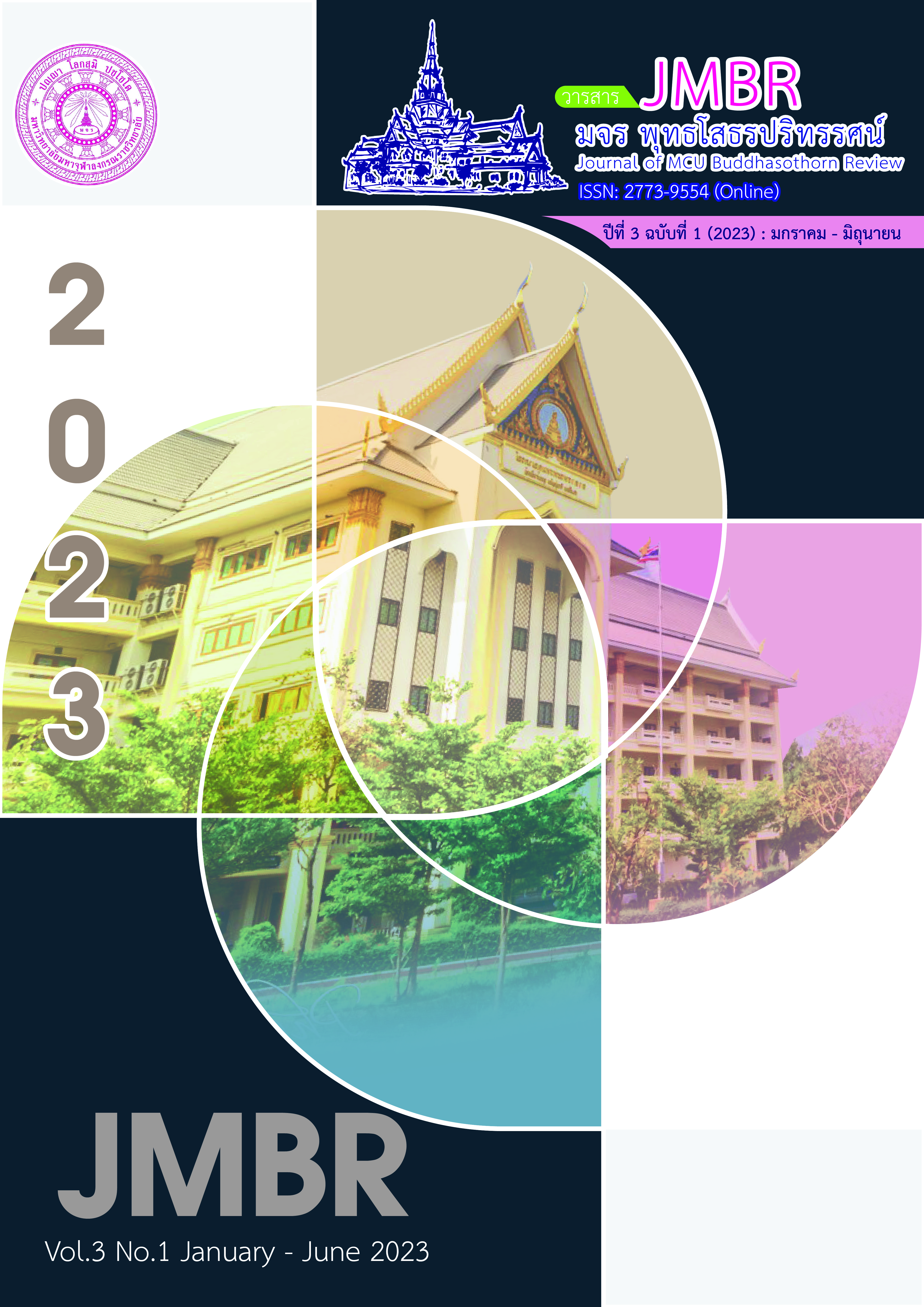Moral Criticize: Dealing with 12 Main Popularities to Recitation of Thai Students
Main Article Content
Abstract
Among the trend of society and culture in 21st century, the education is most important for Thai society and permit the Thai students to have the rights of freedom to express and the needed condition for the learning development, in order to give the children to reasonably analyze and criticize to discover the answers. It was well-known that the teachers and people in the society should have done it frankly. This dialogue has criticized and reflected a dimension of idea in the topic specified the 12 types of the main popularity. And then they made or produced it as the recitation for students in order to learn how to reflect the problem that the header of government had wanted to create the political ideology through the popularity regulation, belief and culture for the students and they performed in an education system to definitely propagate the obedience, respect, trust to accept to the state’s power. The purpose of this dialogue is to present the ideas to realize and appreciate to the rights of the expression freedom which is the necessary conditions of the democracy rule, because the main popularity was criticized in the 3 points as follows: -
- The popularity made the people and students lose their individuality.
- The popularity made the base of some idea for being the authoritarianism or dictatorship.
- The popularity is ambiguously and criticized frankly.
Article Details

This work is licensed under a Creative Commons Attribution-NonCommercial-NoDerivatives 4.0 International License.
ต้นฉบับที่ได้รับการตีพิมพ์ในวารสาร มจร พุทธโสธรปริทรรศน์ วิทยาลัยสงฆ์พุทธโสธร มหาวิทยาลัยมหาจุฬาลงกรณราชวิทยาลัย ถือเป็นกรรมสิทธิ์ของวิทยาลัยสงฆ์พุทธโสธร มหาวิทยาลัยมหาจุฬาลงกรณราชวิทยาลัย ห้ามนำข้อความทั้งหมดหรือบางส่วนไปพิมพ์ซ้ำ เว้นเสีย แต่ว่าจะได้รับอนุญาตจากวิทยาลัยฯ เป็นลายลักษณ์อักษร และเพื่อให้เป็นไปตามกฎหมายลิขสิทธิ์ ผู้เขียนทุกท่านต้องลงลายมือชื่อในแบบฟอร์มใบมอบลิขสิทธิ์ บทความให้แก่วารสาร พร้อมกับบทความต้นฉบับที่ได้แก้ไขครั้งสุดท้าย นอกจากนี้ ผู้เขียนทุกท่านต้องยืนยันว่าบทความต้นฉบับที่ส่งมาตีพิมพ์นั้น ได้ส่งมาตีพิมพ์เฉพาะในวารสาร มจร พุทธโสธรปริทรรศน์ เพียงแห่งเดียวเท่านั้น
References
กฤษณมูรติ. (2549). มิติใหม่ทางการศึกษา เพื่อความเป็นมนุษย์ที่สมบูรณ์ Krishanamurti On Education. พยับแดด แปล, กรุงเทพฯ: อมรินทร์พริ้นติ้งแอนด์พับลิชชิ่ง.
ทินพันธุ์ นาคะตะ. (2545). ประชาธิปไตยไทย. พิมพ์ครั้งที่ 3. กรุงเทพฯ: สหายบล็อกและการพิมพ์.
ธงชัย วินิจฉัยกูล. (2556). ประชาธิปไตยที่มีพระมหากษัตริย์อยู่เหนือการเมือง. พิมพ์ครั้งที่ 1. นนทบุรี: ฟ้าเดียวกัน.
บรรเจิด สิงคะเนติ. (2552). หลักพื้นฐานของสิทธิเสรีภาพและศักดิ์ศรีความเป็นมนุษย์. พิมพ์ครั้งที่ 3. กรุงเทพฯ: วิญญูชน.
เบอร์ทรันด์ รัสเซลล์. (2533). ระเบียบสังคม - ระบบการศึกษา บทวิพากษ์ความสัมพันธ์ระหว่างการศึกษากับรัฐ, สุวรรณา สถาอานันท์ แปล, กรุงเทพฯ: คบไฟ,
พิพัฒน์ พสุธารชาติ. (2553). รัฐกับศาสนา บทความว่าด้วยอาณาจักร ศาสนจักร และเสรีภาพ. พิมพ์ครั้งที่ 3. กรุงเทพฯ: สำนักพิมพ์ศยาม.
ศุภมิตร ปิติพัฒน์. (2555). บทวิพากษ์ธรรมวิทยาแห่งพลเมืองของประกาศกร่วมสมัย : เกษียร เตชพีระ, ธงชัย วินิจจะกุล และ สมศักดิ์ เจียมธีรสกุล. กรุงเทพฯ: จุฬาลงกรณ์มหาวิทยาลัย.
สมบัติ จันทรวงศ์. (2528). มหาชนรัฐ และประชาธิปไตย. กรุงเทพฯ: ธรรมศาสตร์.
สำนักงานส่งเสริมการศึกษานอกระบบและการศึกษาตามอัธยาศัย. (14 ตุลาคม 2557). ค่านิยมหลักของคนไทย 12 ประการ ตามนโยบายของ คสช. สืบค้นเมื่อ วันที่ 30 พฤษภาคม 2566, จาก https://www.moe.go.th.
เสกสรรค์ ประเสริฐกุล. (2548). การเมืองภาคประชาชนในระบอบประชาธิปไตยไทย. กรุงเทพฯ: อมรินทร์.
อีริค ฟรอมม์. (2539). หนีไปจากเสรีภาพ, สมบัติ พิศสะอาด แปล, พิมพ์ครั้งที่ 2. กรุงเทพฯ: มูลนิธิเด็ก.
เอกศักดิ์ ยุกตะนันท์. (2554). มนุษย์กับการรู้จักตนเอง การรู้จักตนเองสำหรับคนหนุ่มสาวในสังคมไทย. พิมพ์ครั้งที่ 1. ขอนแก่น: โรงพิมพ์มหาวิทยาลัยขอนแก่น.


